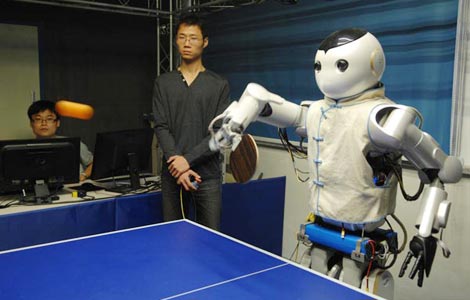Parents in E China lose baby to fertility drugs
Updated: 2011-10-09 22:33
(Xinhua)
|
|||||||||||
HANGZHOU - Jin Shunli and his wife Li Aidi became parents of quadruplets on August 21, but their happiness didn't last. Soon after their babies' birth, one died and the other three currently require lung ventilators.
The heaviest baby weighs one kilogram (2 pounds) and the lightest weighs 0.73 kilogram. Their organs failed to develop correctly, especially their lungs.
Jin Shunli blamed himself, thinking he failed to take good care of his wife during her pregnancy, but in fact, the culprit may be the fertility drug clomiphene citrate, according to Dr Zheng Yangming, of Yuying Children's Hospital in Zhejiang province.
After years of struggling to get pregnant, a doctor in Guangdong suggested that Li take fertility drugs.
"We yearned for a baby, but the doctor didn't tell us the risks, so I took the drug," Li said.
Four months later, Li got good news - she would be a mother. Her dream had finally come true - and beyond, as her obstetrician told her that she carried four embryos. Li smiled and recalled the Chinese proverb, "more children, more happiness."
Perhaps the desire of more and more would-be mothers eager to have twins or multiple births can be attributed to this proverb. Statistics show China is facing an unprecedented wave of multiple births, and this means a significant number of women are choosing to take fertility drugs or use other methods to increase their number of fetuses.
According to the State Food and Drug Administration, fertility drugs are being and have been supervised strictly. They're only available with a doctor's prescription in hospitals. Yet, unlicensed online shops are known to sell fertility drugs, and they're crafty in avoiding regulation.
"We issued a ban on the sale of fertility drugs two years ago, but the dealers change the name of their shops and drugs to avoid supervision, so it's hard to obtain sufficient evidence to shut them down," said a staff member at Taobao.com, China's largest online marketplace.
Both women and their children face serious health problems when they choose to use fertility drugs without proper supervision, said Huang Hefeng, vice president of Zhejiang University School of Medicine.
Liu Jingbo, director of an inspection team from the Hangzhou Food and Drug Administration, said there needs to be a coordinated crack down on the illegal drug trade.
"Government should strengthen education and publicity to raise awareness of adverse drug reactions and inform people of proper usage," Liu said.
For Jin and Li, the survival of their three babies may be determined by money. The couple, living in a poverty-stricken area in the city of Wenzhou, earn 1,900 yuan monthly, yet the medical treatment costs more than 5,000 ($784) yuan every day. This past month their expenses reached 150,000 yuan, which despite the donations they've received, has completely exhausted their funds.
"My babies have to remain hospitalized at least five more weeks, but I have no money left," Jin said, fighting back tears.
Hot Topics
Libya conflict, Gaddafi, Oil spill, Palace Museum scandal, Inflation, Japan's new PM, Trapped miners, Mooncake tax, Weekly photos, Hurricane Irene
Editor's Picks

|

|

|

|

|

|






